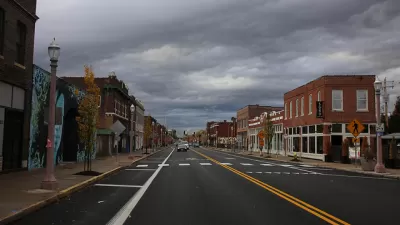The city of St. Louis is in the midst of an intense political debate—with mayoral consequences—on the subject of development incentives, which critics say just help the rich get richer.

According to an article by Jacob Barker and Koran Addo, mayoral candidates in the city of St. Louis have found an issue they can agree on: the need to reform development incentives.
According to the article, "public incentives such as property tax abatement and tax-increment financing that often subsidize [redevelopment] projects are under growing scrutiny, and candidates running to be the city’s new mayor agree that some changes in approach are overdue."
The concerns of the seven remaining mayoral candidates echo the controversies surrounding development incentives in Chicago, according to the article:
Concerns have mounted over the amount of city and school district revenue being returned to the developments, estimated at some $709 million between 2000 and 2014. Others worry the incentives mainly benefit the city’s central corridor, where most development occurs.
Outgoing Mayor Francis Slay committed to reform of the city's current system of development incentives back in October 2016, acknowledging that some projects received benefits that could have afforded to proceed without the incentives, forcing the city to forgo possible sources of revenue.
Meanwhile the issue remains a hot button for some candidates for the Mayor's Office who have voted for development incentives as previous stops in their political career.
FULL STORY: Mayoral candidates agree reform of St. Louis development incentives overdue

Maui's Vacation Rental Debate Turns Ugly
Verbal attacks, misinformation campaigns and fistfights plague a high-stakes debate to convert thousands of vacation rentals into long-term housing.

Planetizen Federal Action Tracker
A weekly monitor of how Trump’s orders and actions are impacting planners and planning in America.

In Urban Planning, AI Prompting Could be the New Design Thinking
Creativity has long been key to great urban design. What if we see AI as our new creative partner?

King County Supportive Housing Program Offers Hope for Unhoused Residents
The county is taking a ‘Housing First’ approach that prioritizes getting people into housing, then offering wraparound supportive services.

Researchers Use AI to Get Clearer Picture of US Housing
Analysts are using artificial intelligence to supercharge their research by allowing them to comb through data faster. Though these AI tools can be error prone, they save time and housing researchers are optimistic about the future.

Making Shared Micromobility More Inclusive
Cities and shared mobility system operators can do more to include people with disabilities in planning and operations, per a new report.
Urban Design for Planners 1: Software Tools
This six-course series explores essential urban design concepts using open source software and equips planners with the tools they need to participate fully in the urban design process.
Planning for Universal Design
Learn the tools for implementing Universal Design in planning regulations.
planning NEXT
Appalachian Highlands Housing Partners
Mpact (founded as Rail~Volution)
City of Camden Redevelopment Agency
City of Astoria
City of Portland
City of Laramie





























